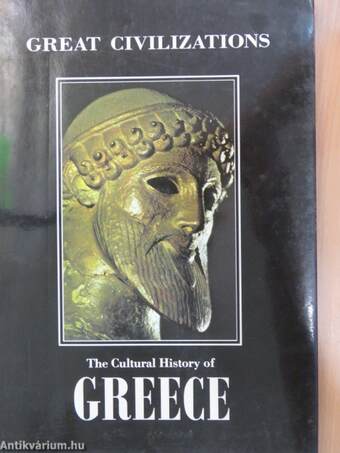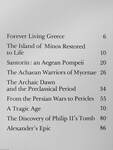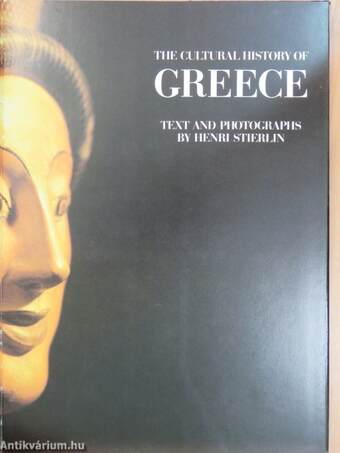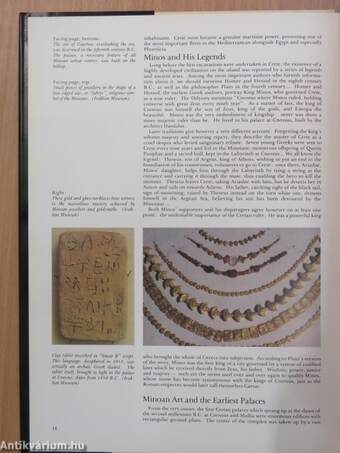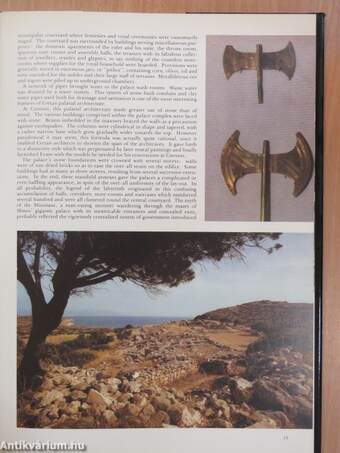1.067.339
kiadvánnyal nyújtjuk Magyarország legnagyobb antikvár könyv-kínálatát

VISSZA
A TETEJÉRE
JAVASLATOKÉszre-
vételek
The Cultural History of Greece
| Kiadó: | Aurum Press Ltd. |
|---|---|
| Kiadás helye: | London |
| Kiadás éve: | |
| Kötés típusa: | Fűzött kemény papírkötés |
| Oldalszám: | 96 oldal |
| Sorozatcím: | Great Civilizations |
| Kötetszám: | |
| Nyelv: | Angol |
| Méret: | 33 cm x 23 cm |
| ISBN: | 0-906053-64-1 |
| Megjegyzés: | Színes fotókkal gazdagon illusztrált album. |
naponta értesítjük a beérkező friss
kiadványokról
naponta értesítjük a beérkező friss
kiadványokról
Fülszöveg
THE CULTURAL HISTORY
OF ANCIENT GREECE
Ancient Greece is the mother of our Western
civilization. She gave birth to our manner of
thinking as well as to our aesthetic ideals, and
represents a universe of discourse to which we
continually refer without knowing it, so endur-
ing are the cultural ties which bind us to her.
Hellas, the traditional name given to
mainland Greece, includes the Peloponnesus,
Macedonia and the long string of small
islands stretching east towards Asia. Magna
Graecia, the 'larger Greece' of the ancient
maritime empire, incorporates the colonies
settled by Achaeans at the dawn of Hellenic
civilization in southern Italy and Sicily—the
glorious city states of Cumae, Syracuse,
Agrigentum, Segesta and Paestum.
This book gives a concise yet complete ac-
count of the artistic and architectural heritage
of the Magna Graecia over a period of more
than two thousand years. It begins with the
Cycladic idols, the earliest evidence of Greek
genius... Tovább
Fülszöveg
THE CULTURAL HISTORY
OF ANCIENT GREECE
Ancient Greece is the mother of our Western
civilization. She gave birth to our manner of
thinking as well as to our aesthetic ideals, and
represents a universe of discourse to which we
continually refer without knowing it, so endur-
ing are the cultural ties which bind us to her.
Hellas, the traditional name given to
mainland Greece, includes the Peloponnesus,
Macedonia and the long string of small
islands stretching east towards Asia. Magna
Graecia, the 'larger Greece' of the ancient
maritime empire, incorporates the colonies
settled by Achaeans at the dawn of Hellenic
civilization in southern Italy and Sicily—the
glorious city states of Cumae, Syracuse,
Agrigentum, Segesta and Paestum.
This book gives a concise yet complete ac-
count of the artistic and architectural heritage
of the Magna Graecia over a period of more
than two thousand years. It begins with the
Cycladic idols, the earliest evidence of Greek
genius dating back to the second millennium
B.C., and the first Cretan palaces, and extends
right through to the last centuries of the pre-
Christian era.
Yet Greece has not ceased to bequeath us her
treasures. Our knowlegde of her ancient
world has been transformed by the extraor-
dinary archaeological discoveries of the past
few decades. On the island of Santorin an en-
tire cross-section of Minoan civilization has
recently been brought to life, complete with
streets, dwellings, storerooms and marvellous-
ly preserved mural paintings. In Macedonia,
the opulent tomb of Philip II, father of Alex-
ander the Great, has been unearthed; a sensa-
tional treasure trove of gold and silver
metalwork, jewellery, ivory friezes, caskets
and sculpture from the early Classic period,
it is a discovery comparable in scale and his-
torical importance to that of Pompeii or
Tutankhamen's hypogeum in Egypt in 1922.
Henri Stierlin's stunning photography
perfectly complements his informative nar-
rative to give a fresh and inspiring overview of
one of the greatest civilizations ever recorded in
history. Vissza
Témakörök
- Idegennyelv > Idegennyelvű könyvek > Angol > Művelődéstörténet
- Idegennyelv > Idegennyelvű könyvek > Angol > Történelem > Európa története > Egyéb
- Művelődéstörténet > Civilizációtörténet > Európai
- Művelődéstörténet > Kultúra > Története
- Történelem > Idegennyelvű > Angol
- Régészet > Általános régészet, antropológia > Ókor
- Idegennyelv > Idegennyelvű könyvek > Angol > Régészet > Általános régészet, antropológia > Ókor
- Idegennyelv > Idegennyelvű könyvek > Angol > Régészet > Kontinensek szerint > Európa
- Régészet > Kontinensek szerint > Európa > Egyéb
- Történelem > Régészet > Általános régészet, antropológia > Ókor
- Történelem > Régészet > Kontinensek szerint > Európa > Egyéb



